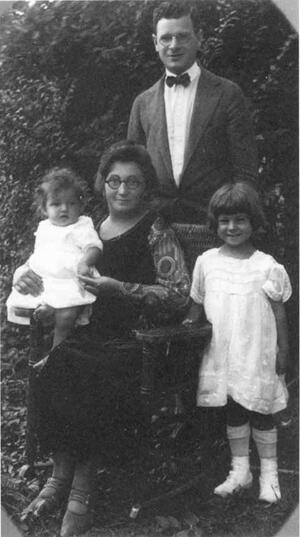Labor leaders announce their engagement at May Day Parade
Born in Russia in 1889, Bessie Abramowitz Hillman immigrated to Chicago at age 15 to escape an arranged marriage. Within five years, she had become a leader among the workers in a garment factory. In 1910, she instigated a walkout by 16 women to protest a pay cut. Although the strike was ridiculed at first, it soon spread to thousands of workers in several plants, and won the support of reformer Jane Addams and her influential Hull House settlement. As a result, Hillman was hired as an organizer for the Women's Trade Union League. She would be active in union activity for the rest of her long life.
In 1914, when the Amalgamated Clothing Workers of America split from the more conservative United Garment Workers, Abramowitz was elected to the Amalgamated's executive board. Marking their joined lives and work, Abramowitz and Amalgamated president Sidney Hillman announced their engagement on May 1, 1916, while marching at the head of the clothing workers' contingent of the Chicago May Day Parade. They were married two days later. Because wives were expected not to work, her union work for the following 30 years was as a volunteer. During the 1920s, she organized workers in Pennsylvania, Ohio, New York, and Connecticut, working with both immigrant and native-born workers. In 1937, she became the education director of the Laundry Workers Joint Board. Her work with the laundry union's large non-white membership drew Hillman into civil rights work.
When Sidney Hillman died in 1946, Bessie took a paid position as vice president for education in the Amalgamated Clothing Workers union, a position she held until her death. In that role, she not only spoke at conferences and organized summer schools for workers, but also pushed the union to work for civil rights and peace. Hillman's union work led to involvement in broader social justice causes as well. She worked with the Child Welfare Committee of New York, the American Association for the United Nations, the National Consumers League, and the AFL-CIO Civil Rights Committee, as well as many other organizations. In 1963, President John F. Kennedy appointed her to his historic President's Commission on the Status of Women, which documented widespread economic discrimination against women and was an important element in the rise of second wave feminism.
Bessie Abramowitz Hillman died on December 23, 1970.
Sources: Steven Fraser, Labor Will Rule: Sidney Hillman and the Rise of American Labor (1991); Jewish Women in America: An Historical Encyclopedia, pp. 632-634; New York Times, December 24, 1970.



